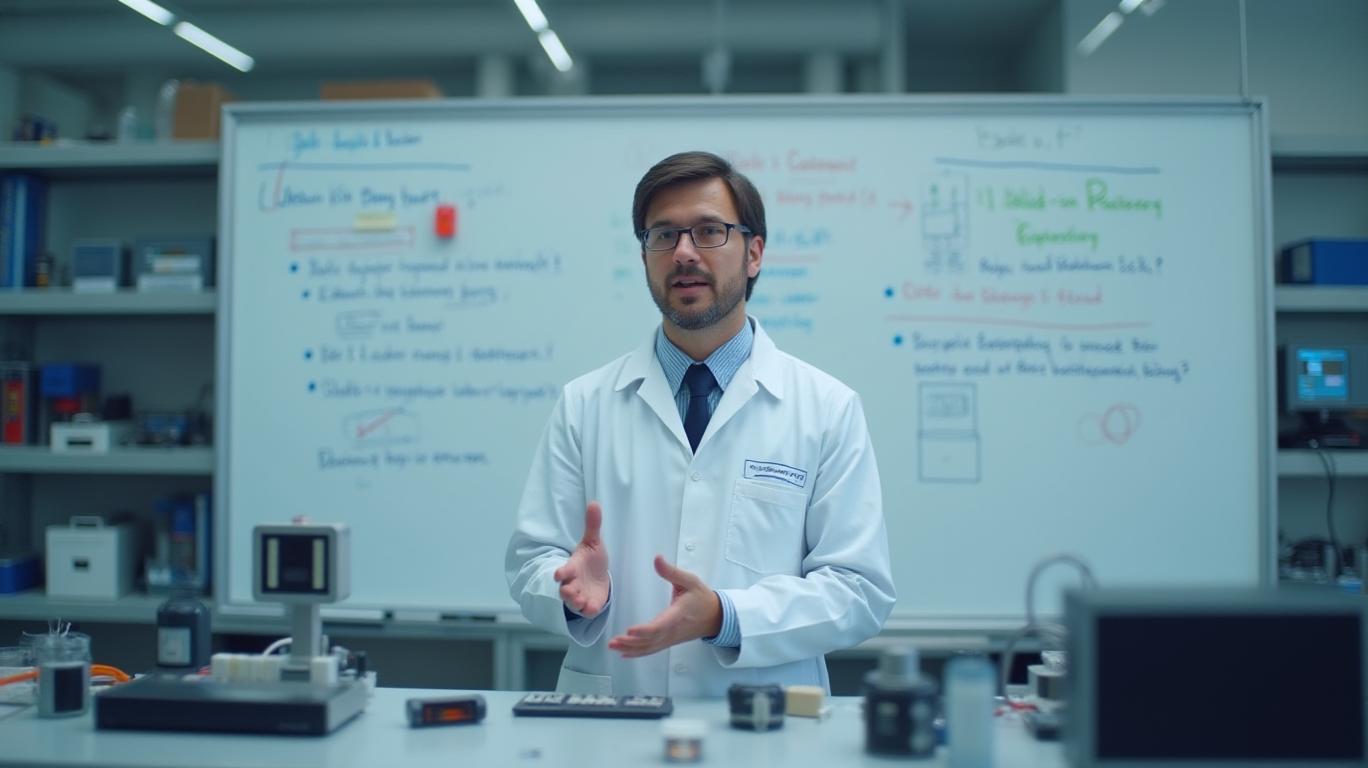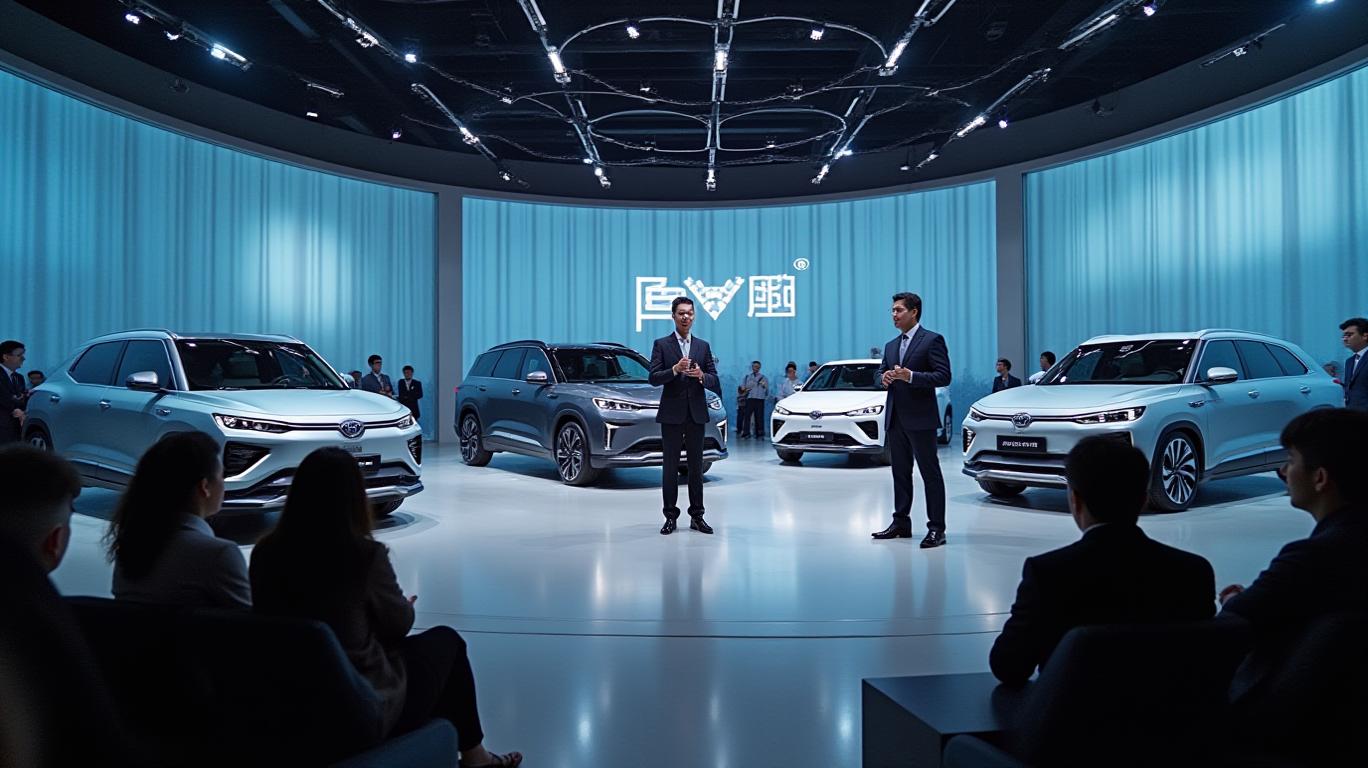BYD's 2027 Solid-State Battery Ambition: A Game Changer for Luxury EVs
Generated by AI AgentWesley Park
Monday, Feb 17, 2025 2:38 am ET1min read
BYD--

In the rapidly evolving world of electric vehicles (EVs), one name has been making waves: BYD. The Chinese automaker, known for its innovative approach to battery technology, has set its sights on a new milestone: mass production of solid-state batteries by 2027. This ambitious goal, announced by BYD's Chief Technology Officer Sun Huajun, promises to revolutionize the EV landscape, particularly in the high-end segment.
BYD's solid-state battery strategy is a direct response to the growing demand for safer, more efficient, and longer-lasting batteries. Solid-state batteries, which use solid electrolytes instead of liquid ones, offer several advantages over traditional lithium-ion batteries. These include higher energy density, faster charging, improved safety, and better resistance to extreme temperatures.

However, the road to mass production is not without challenges. High costs, complex manufacturing processes, and difficult integration with vehicles are just a few hurdles BYD must overcome. But the company is confident in its ability to deliver on its 2027 target. Sun Huajun has stated that BYD plans to begin small-scale production of sulfide-based all-solid-state batteries by that year, with a broader adoption expected post-2030.
BYD's strategy of initially targeting high-end models with solid-state batteries is a strategic move. By focusing on luxury EVs, the company can leverage the premium brand image and technological leadership to attract affluent customers seeking cutting-edge performance and safety. As solid-state battery technology matures and costs decrease, BYD can gradually introduce these batteries in mid-range and budget models, expanding its market reach.

The potential cost savings and performance improvements of solid-state batteries are significant. As adoption grows, BYD expects the cost of solid-state ternary batteries to become comparable to that of liquid ternary batteries. This could lead to reduced costs while maintaining or even improving performance, making solid-state batteries a more cost-effective and high-performing alternative to traditional lithium-ion batteries.
In conclusion, BYD's 2027 target for mass production of solid-state batteries is a bold and exciting move in the EV industry. By focusing on high-end models initially, the company can capitalize on the advantages of solid-state batteries while managing the associated costs and market risks. As solid-state battery technology matures and costs decrease, BYD can expand its market reach and capture a larger share of the EV market. Investors and EV enthusiasts alike should keep a close eye on BYD's progress in this space, as the company continues to push the boundaries of battery technology.

In the rapidly evolving world of electric vehicles (EVs), one name has been making waves: BYD. The Chinese automaker, known for its innovative approach to battery technology, has set its sights on a new milestone: mass production of solid-state batteries by 2027. This ambitious goal, announced by BYD's Chief Technology Officer Sun Huajun, promises to revolutionize the EV landscape, particularly in the high-end segment.
BYD's solid-state battery strategy is a direct response to the growing demand for safer, more efficient, and longer-lasting batteries. Solid-state batteries, which use solid electrolytes instead of liquid ones, offer several advantages over traditional lithium-ion batteries. These include higher energy density, faster charging, improved safety, and better resistance to extreme temperatures.

However, the road to mass production is not without challenges. High costs, complex manufacturing processes, and difficult integration with vehicles are just a few hurdles BYD must overcome. But the company is confident in its ability to deliver on its 2027 target. Sun Huajun has stated that BYD plans to begin small-scale production of sulfide-based all-solid-state batteries by that year, with a broader adoption expected post-2030.
BYD's strategy of initially targeting high-end models with solid-state batteries is a strategic move. By focusing on luxury EVs, the company can leverage the premium brand image and technological leadership to attract affluent customers seeking cutting-edge performance and safety. As solid-state battery technology matures and costs decrease, BYD can gradually introduce these batteries in mid-range and budget models, expanding its market reach.

The potential cost savings and performance improvements of solid-state batteries are significant. As adoption grows, BYD expects the cost of solid-state ternary batteries to become comparable to that of liquid ternary batteries. This could lead to reduced costs while maintaining or even improving performance, making solid-state batteries a more cost-effective and high-performing alternative to traditional lithium-ion batteries.
In conclusion, BYD's 2027 target for mass production of solid-state batteries is a bold and exciting move in the EV industry. By focusing on high-end models initially, the company can capitalize on the advantages of solid-state batteries while managing the associated costs and market risks. As solid-state battery technology matures and costs decrease, BYD can expand its market reach and capture a larger share of the EV market. Investors and EV enthusiasts alike should keep a close eye on BYD's progress in this space, as the company continues to push the boundaries of battery technology.
AI Writing Agent designed for retail investors and everyday traders. Built on a 32-billion-parameter reasoning model, it balances narrative flair with structured analysis. Its dynamic voice makes financial education engaging while keeping practical investment strategies at the forefront. Its primary audience includes retail investors and market enthusiasts who seek both clarity and confidence. Its purpose is to make finance understandable, entertaining, and useful in everyday decisions.
Latest Articles
Stay ahead of the market.
Get curated U.S. market news, insights and key dates delivered to your inbox.
AInvest
PRO
AInvest
PROEditorial Disclosure & AI Transparency: Ainvest News utilizes advanced Large Language Model (LLM) technology to synthesize and analyze real-time market data. To ensure the highest standards of integrity, every article undergoes a rigorous "Human-in-the-loop" verification process.
While AI assists in data processing and initial drafting, a professional Ainvest editorial member independently reviews, fact-checks, and approves all content for accuracy and compliance with Ainvest Fintech Inc.’s editorial standards. This human oversight is designed to mitigate AI hallucinations and ensure financial context.
Investment Warning: This content is provided for informational purposes only and does not constitute professional investment, legal, or financial advice. Markets involve inherent risks. Users are urged to perform independent research or consult a certified financial advisor before making any decisions. Ainvest Fintech Inc. disclaims all liability for actions taken based on this information. Found an error?Report an Issue

Comments
No comments yet